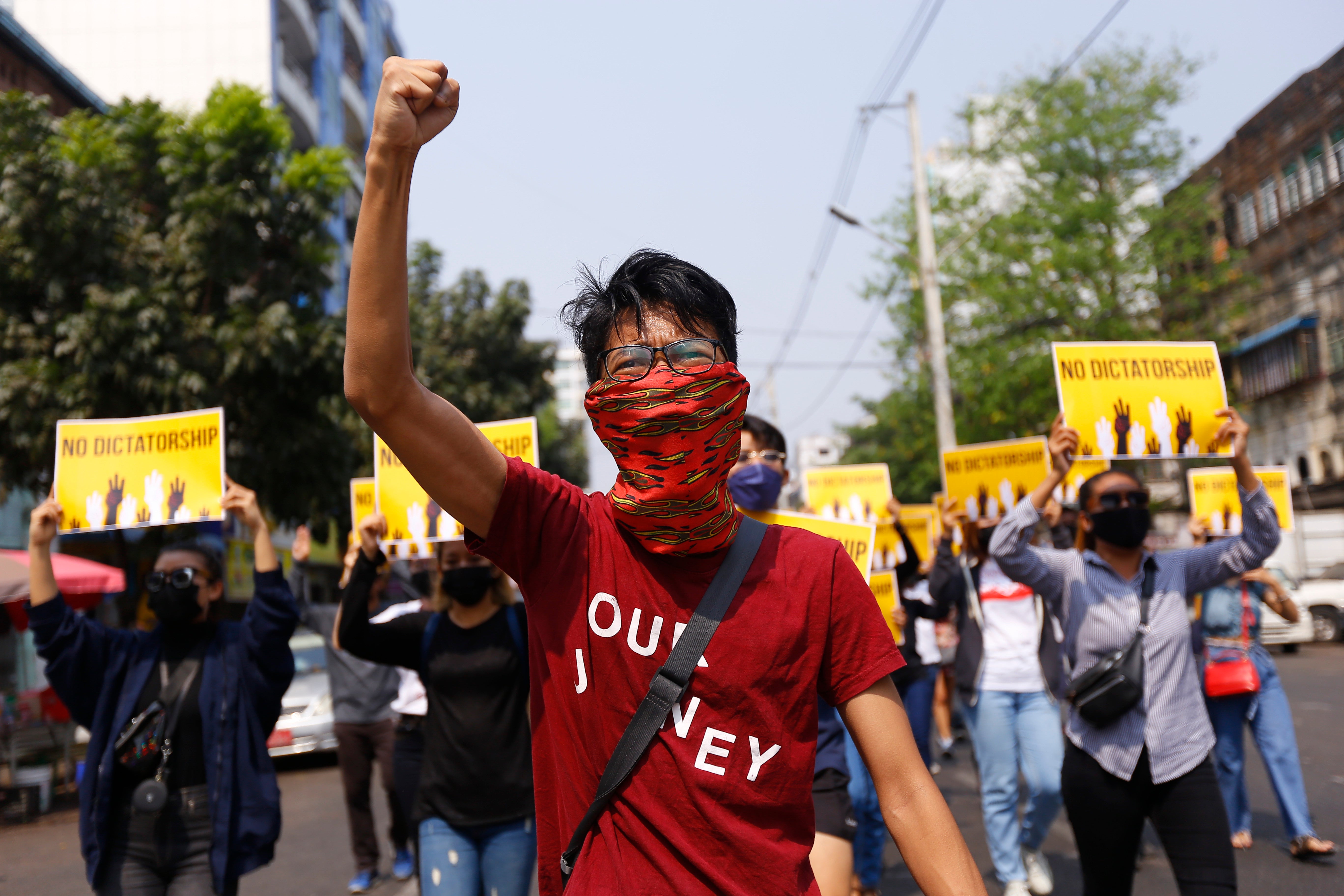Myanmar protest deaths top 300 as US, UK, impose sanctions
The death toll for protesters confirmed killed in Myanmar since last month’s military takeover has surpassed 300

Your support helps us to tell the story
From reproductive rights to climate change to Big Tech, The Independent is on the ground when the story is developing. Whether it's investigating the financials of Elon Musk's pro-Trump PAC or producing our latest documentary, 'The A Word', which shines a light on the American women fighting for reproductive rights, we know how important it is to parse out the facts from the messaging.
At such a critical moment in US history, we need reporters on the ground. Your donation allows us to keep sending journalists to speak to both sides of the story.
The Independent is trusted by Americans across the entire political spectrum. And unlike many other quality news outlets, we choose not to lock Americans out of our reporting and analysis with paywalls. We believe quality journalism should be available to everyone, paid for by those who can afford it.
Your support makes all the difference.The death toll for protesters confirmed killed in Myanmar since last month’s military takeover has surpassed 300, a group that verifies details of deaths and arrests announced Friday.
Myanmar’s Assistance Association for Political Prisoners said its tally of 320 dead includes only documented cases, with the actual number of casualties “likely much higher.” It said 11 people were killed Thursday, when it also managed to verify 23 deaths that occurred previously.
The group also said that as of Thursday, 2,981 people had been arrested, charged or sentenced in the crackdown since the Feb. 1 coup that ousted the elected government of Aung San Suu Kyi Most, including Suu Kyi and President Win Myint, remain detained.
The army's seizure of power halted the Southeast Asian nation’s move toward democracy that began when Suu Kyi’s party took office in 2016 for its first term, after more than five decades of military rule.
The movement against the junta and its takeover received a major boost Thursday when the United States and Britain announced tough sanctions against two military-owned conglomerates with vast holdings in many sectors.
The U.S. Treasury Department said its action against Myanma Economic Holdings Public Company Limited and Myanmar Economic Corporation Limited targets the army’s control of large parts of the country’s economy, “which is a vital financial lifeline for the military junta.”
The sanctions against the two companies and their holdings block access to any property they control in the United States and effectively bars any U.S. person or company from conducting any sort of business with them, including supplying them with funds or providing goods or services.
Myanmar’s home-grown “Civil Disobedience Movement” against military rule is targeting the economy in order to make it difficult for the junta to govern. It has advocated work stoppages by state enterprise workers, bank closures and disinvestment by foreign companies.
Myanmar’s economy is already battered by the COVID-19 pandemic, which surged there in the second half of last year.
The World Bank in a Asia-wide review released Friday, forecast that Myanmar’s economy will contract by 10% in 2021 after growing a meager 1.7% in 2020 and 6.8% in 2019.
Anti-coup protests continued Friday in cities and towns across Myanmar, despite the threat of lethal force by the security forces. Reports on social media of casualties caused by the security forces could not immediately be confirmed.
At about 4 a.m. Friday, unidentified people tossed firebombs at the headquarters of Suu Kyi's National League for Democracy party in Yangon but nearby residents managed to put out the fire before it could cause any major damage.
The Assistance Association for Political Prisoners described a typical deadly confrontation Thursday in Taunggyi, in Shan State in eastern Myanmar, when “the junta used live ammunition, trying to create a combat zone of residential areas, resulting in four civilians shot and killed, one dead body was dragged away, some other civilians were injured.
“Moreover, junta forces raided houses and violently arrested youths and civilians, thereafter destroying motorcycles, cars and barricades. They stormed streets unprovoked, shouted obscenities and vandalized property.”
The Civil Disobedience Movement — CDM — which was founded largely by medical workers, has drawn plaudits for its strategy, including a nomination for the 2022 Nobel Peace Prize by six social science professors at the University of Oslo in Norway.
“Our nomination is a recognition of this anti-coup resistance that is working for peace and democracy through non-violent means,” said their nomination letter.
Speaking for the six, Professor Kristian Stokke told The Associated Press their hope is that “the Peace Prize nomination will generate further international recognition and support for the movement and its peaceful aims and means.”
A leading member of the CDM, who asked not to be identified out of fear for his safety, said the nomination “reiterates the need for the junta ... to refrain from any type of violence and peacefully and immediately transfer the power to the democratically elected leaders of the nation.”
Suu Kyi won the Nobel Peace Prize for 1991 for leading a nonviolent struggle against a previous military dictatorship.